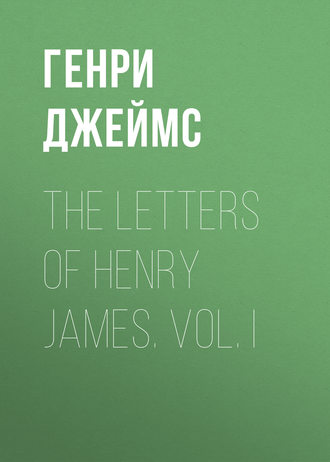
Генри Джеймс
The Letters of Henry James. Vol. I
To George Henschel
Answering a suggestion that H. J. should write a libretto to be set to music by Sir George Henschel.
34 De Vere Gardens, W.January 22d, 1895.
My dear Henschel,
Your flattering dream is beautiful—but, I fear, alas, delusive. When I say I 'fear' it, I mean I only too completely feel it. It is a charming idea, but the root of the libretto is not in me. We will talk of it—yes: because I will talk with you, with joy, of anything—will even play to myself that I have convictions I haven't, for that privilege. But I am unlyrical, unmusical, unrhythmical, unmanageable. And I hate "old New England stories"!—which are lean and pale and poor and ugly. But let us by all means talk—and the more the better. I am touched by your thinking so much good of me—and I embrace you, my dear Henschel, for such rich practical friendship and confidence. I congratulate you afresh on your glorious wife, I await you with impatience, and I stretch out to you across the wintry wastes the very grateful hand of yours always,
HENRY JAMES.
To W. D. Howells
34 De Vere Gardens, W.January 22d, 1895.
My dear Howells,
I am indebted to you for your most benignant letter of December last. It lies open before me and I read it again and am soothed and cheered and comforted again. You put your finger sympathetically on the place and spoke of what I wanted you to speak of. I have felt, for a long time past, that I have fallen upon evil days—every sign or symbol of one's being in the least wanted, anywhere or by any one, having so utterly failed. A new generation, that I know not, and mainly prize not, has taken universal possession. The sense of being utterly out of it weighed me down, and I asked myself what the future would be. All these melancholies were qualified indeed by one redeeming reflection—the sense of how little, for a good while past (for reasons very logical, but accidental and temporary,) I had been producing. I did say to myself "Produce again—produce; produce better than ever, and all will yet be well;" and there was sustenance in that so far as it went. But it has meant much more to me since you have said it—for it is, practically, what you admirably say. It is exactly, moreover, what I meant to admirably do—and have meant, all along, about this time to get into the motion of. The whole thing, however, represents a great change in my life, inasmuch as what is clear is that periodical publication is practically closed to me—I'm the last hand that the magazines, in this country or in the U.S., seem to want. I won't afflict you with the now accumulated (during all these past years) evidence on which this induction rests—and I have spoken of it to no creature till, at this late day, I speak of it to you.... All this, I needn't say, is for your segretissimo ear. What it means is that "production" for me, as aforesaid, means production of the little book, pure and simple—independent of any antecedent appearance; and, truth to tell, now that I wholly see that, and have at last accepted it, I am, incongruously, not at all sorry. I am indeed very serene. I have always hated the magazine form, magazine conditions and manners, and much of the magazine company. I hate the hurried little subordinate part that one plays in the catchpenny picture-book—and the negation of all literature that the insolence of the picture-book imposes. The money-difference will be great—but not so great after a bit as at first; and the other differences will be so all to the good that even from the economic point of view they will tend to make up for that and perhaps finally even completely do so. It is about the distinctness of one's book-position that you have so substantially reassured me; and I mean to do far better work than ever I have done before. I have, potentially, improved immensely and am bursting with ideas and subjects—though the act of composition is with me more and more slow, painful and difficult. I shall never again write a long novel; but I hope to write six immortal short ones—and some tales of the same quality. Forgive, my dear Howells, the cynical egotism of these remarks—the fault of which is in your own sympathy. Don't fail me this summer. I shall probably not, as usual, absent myself from these islands—not be beyond the Alps as I was when you were here last. That way Boston lies, which is the deadliest form of madness. I sent you only last night messages of affection by dear little "Ned" Abbey, who presently sails for N.Y. laden with the beautiful work he has been doing for the new Boston public library. I hope you will see him—he will speak of me competently and kindly. I wish all power to your elbow. Let me hear as soon as there is a sound of packing. Tell Mildred I rejoice in the memory of her. Give my love to your wife, and believe me, my dear Howells, yours in all constancy,
HENRY JAMES.
To William James
34 De Vere Gardens, W.February 2nd, 1895.
The poor little play seems already, thank God, ancient history, though I have lived through, in its company, the horridest four weeks of my life. Produce a play and you will know, better than I can tell you, how such an ordeal—odious in its essence!—is only made tolerable and palatable by great success; and in how many ways accordingly non-success may be tormenting and tragic, a bitterness of every hour, ramifying into every throb of one's consciousness. Tonight the thing will have lived the whole of its troubled little life of 31 performances, and will be "taken off," to be followed, on Feb. 5th, by a piece by Oscar Wilde that will have probably a very different fate. On the night of the 5th, too nervous to do anything else, I had the ingenious thought of going to some other theatre and seeing some other play as a means of being coerced into quietness from 8 till 10.45. I went accordingly to the Haymarket, to a new piece by the said O.W. that had just been produced—"An Ideal Husband." I sat through it and saw it played with every appearance (so far as the crowded house was an appearance) of complete success, and that gave me the most fearful apprehension. The thing seemed to me so helpless, so crude, so bad, so clumsy, feeble and vulgar, that as I walked away across St. James's Square to learn my own fate, the prosperity of what I had seen seemed to me to constitute a dreadful presumption of the shipwreck of G.D., and I stopped in the middle of the Square, paralyzed by the terror of this probability—afraid to go on and learn more. "How can my piece do anything with a public with whom that is a success?" It couldn't—but even then the full truth was, "mercifully," not revealed to me; the truth that in a short month my piece would be whisked away to make room for the triumphant Oscar. If, as I say, this episode has, by this time, become ancient history to me, it is, thank heaven, because when a thing, for me (a piece of work,) is done, it's done: I get quickly detached and away from it, and am wholly given up to the better and fresher life of the next thing to come. This is particularly the case now, with my literary way blocked so long and my production smothered by these theatrical lures: I have such arrears on hand and so many things seem to wait for me—that I want far more and that it will be nobler to do—that I am looking in a very different direction than in that of the sacrificed little play. Partly for this reason, this receiving from you all the retarded echo of my reverse and having to live over it with you (you must excuse me if I don't do so much,) is the thing, in the whole business, that has been most of an anguish and that I dreaded most in advance. As for the play, in three words, it has been, I think I may say, a rare and distinguished private success and scarcely anything at all of a public one. By a private success, I mean with the even moderately cultivated, civilised and intelligent individual, with "people of taste" in short, of almost any kind, as distinguished from the vast English Philistine mob—the regular "theatrical public" of London, which, of all the vulgar publics London contains, is the most brutishly and densely vulgar. This congregation the things they do like sufficiently judge.... I no sooner found myself in the presence of those yelling barbarians of the first night and learned what could be the savagery of their disappointment that one wasn't perfectly the same as everything else they had ever seen, than the dream and delusion of my having made a successful appeal to the cosy, childlike, naïf, domestic British imagination (which was what I had calculated) dropped from me in the twinkling of an eye. I saw they couldn't care one straw for a damned young last-century English Catholic, who lived in an old-tune Catholic world and acted, with every one else in the play, from remote and romantic Catholic motives. The whole thing was, for them, remote, and all the intensity of one's ingenuity couldn't make it anything else. It has made it something else for the few—but that is all. Such is the bare history of poor G.D.—which, I beg you to believe, throws no light on my "technical skill" which isn't a light that that mystery ought to rejoice to have thrown. The newspaper people muddle things up with the most foredoomed crudity; and I am capable of analysing the whole thing far more scientifically and drawing from it lessons far more pertinent and practical than all of them put together. It is perfectly true that the novelist has a fearful long row to hoe to get into any practical relation to the grovelling stage, and his difficulty is precisely double: it bears, on one side, upon the question of method and, on the other, upon the question of subject. If he is really in earnest, as I have been, he surmounts the former difficulty before he surmounts the latter. I have worked like a horse—far harder than any one will ever know—over the whole stiff mystery of "technique"—I have run it to earth, and I don't in the least hesitate to say that, for the comparatively poor and meagre, the piteously simplified, purposes of the English stage, I have made it absolutely my own, put it into my pocket. The question of realising how different is the attitude of the theatre-goer toward the quality of thing which might be a story in a book from his attitude toward the quality of thing that is given to him as a story in a play is another matter altogether. That difficulty is portentous, for any writer who doesn't approach it naïvely, as only a very limited and simple-minded writer can. One has to make one's self so limited and simple to conceive a subject, see a subject, simply enough, and that, in a nutshell, is where I have stumbled. And yet if you were to have seen my play! I haven't been near the theatre since the second night, but I shall go down there late this evening to see it buried and bid good-bye to the actors.... I am very sorry for Marion Terry, who has delighted in her part and made the great hit of her career, I should suppose, in it, and who has to give it up thus untimely. Her charming acting has done much for the little run.... The money disappointment is of course keen—as it was wholly for money I adventured. But the poor four weeks have brought me $1,100—which shows what a tidy sum many times four weeks would have brought; without my lifting, as they say, after the first performance, a finger.
I have written you so long-windedly on this matter that I have left neither time nor space for anything else. I must catch the post and will write more sociably something by the next one. One's time, in the whole history, has gone like water, and still it pours out. Please don't send me anything out of newspapers.
Always yourHENRY.
To Sidney Colvin
The first of Stevenson's letters to be published, it will be remembered, were the "Vailima Letters" to Sir Sidney Colvin.
34 De Vere Gardens, W.Feb. 19th, 1895.
My dear Colvin,
I shall send you all the Vailima Letters back to-morrow or next day by hand. I have completely read them. I can't say, and I don't want to say, anything of them but "Publish them—they make the man so loveable." It's on that I should take my stand. I think your estimate of them as ranking high in their class (epistolary) is perhaps (if I remember what you seemed to express of it) a larger one than I should concur in; but I think still more that that makes little difference; for they will assuredly be liked—immensely, and that is mainly what one is concerned to ask for him. They are charming, living, touching, absolutely natural; and I think better toward the end than at the beginning. What they suffer from is: 1º Want of interest and want of clearness as to the subject-matter of much of them—the Samoan personalities, politics, &c; all to me almost squalid—and the irritating effect of one's sense of his clearing the very ground to be able to do his daily work. Want also to a certain extent of generalization about all these matters and some others—into the dreary specifics of which the reader perhaps finds himself plunged too much. 2º A certain tormenting effect in his literary confidences (to you,) glimpses, promises, revelations &c., arising from his so seldom telling the subject, the idea of the thing—what he sees, what he wants to do, &c—as against his pouring forth titles, chapters, divisions, names &c., in such magnificent abundance.—On the other hand the personality shines out so beautiful and there are so many charming things—passages, pages—that not to publish them would seem to me like the burial of something alive. I see but little in what you have left in these copies to excise on grounds of discretion, unless it be many of those reports of the state of public affairs and allusions to public personages which are primarily excisable by reason of obscurity, failure to appeal to reader's interest, &c. But I should like to see you and talk about the matter with you better than thus, and shall take the earliest occasion. The hideous sadness of them—to us! To readers at large—no. But I feel as though I had been sitting with him for hours.
Yours always,HENRY JAMES.
To Mrs. John L. Gardner
Royal Hospital, Dublin.March 23d, 1895.
Dear Isabella Gardner,
Yes, I have delayed hideously to write to you, since receiving your note of many days ago. But I always delay hideously, and my shamelessness is rapidly becoming (in the matter of letter-writing) more disgraceful even than my procrastination. I brought your letter with me to Ireland more than a fortnight ago with every intention of answering it on the morrow of my arrival; but I have been leading here a strange and monstrous life of demoralisation and frivolity and the fleeting hour has mocked, till today, at my languid effort to stay it, to clutch it, in its passage. I have been paying three monstrous visits in a row; and if I needed any further demonstration of the havoc such things make in my life I should find it in this sense of infidelity to a charming friendship of so many years.
I return to England to enter a monastery for the rest of my days—and crave your forgiveness before I take this step. I have been staying in this queer, shabby, sinister, sordid place (I mean Dublin,) with the Lord Lieutenant (poor young Lord Houghton,) for what is called (a fragment, that is, of what is called) the "Castle Season," and now I am domesticated with very kind and valued old friends, the Wolseleys—Lord W. being commander of the forces here (that is, head of the little English army of occupation in Ireland—a five-years appointment) and domiciled in this delightfully quaint and picturesque old structure, of Charles II's time—a kind of Irish Invalides or Chelsea Hospital—a retreat for superannuated veterans, out of which a commodious and stately residence has been carved. We live side by side with the 140 old red-coated cocked-hatted pensioners—but with a splendid great rococo hall separating us, in which Lady Wolseley gave the other night the most beautiful ball I have ever seen—a fancy-ball in which all the ladies were Sir Joshuas, Gainsboroughs, or Romneys, and all the men in uniform, court dress or evening hunt dress. (I went as—guess what!—alas, nothing smarter than the one black coat in the room.) It is a world of generals, aide-de-camps and colonels, of military colour and sentinel-mounting, which amuses for the moment and makes one reflect afresh that in England those who have a good time have it with a vengeance. The episode at the tarnished and ghost-haunted Castle was little to my taste, and was a very queer episode indeed—thanks to the incongruity of a vice-regal "court" (for that's what it considers itself) utterly boycotted by Irish (landlord) society—the present viceroy being the nominee of a home-rule government, and reduced to dreary importation from England to fill its gilded halls. There was a ball every night, etc., but too much standing on one's hind-legs—too much pomp and state—for nothing and nobody. On my return (two days hence) to my humble fireside I get away again as quickly as possible into the country—to a cot beside a rill, the address of which no man knoweth. There I remain for the next six months to come; and nothing of any sort whatever is to happen to me (this is all arranged,) save that you are to come down and stay a day or two with me when you come to England. There is, alas, to be no "abroad" for me this year. I rejoice with you in your Rome—but my Rome is in the buried past. I spent, however, last June there, and was less excruciated than I feared. Have you seen my old friend Giuseppe Primoli—a great friend, in particular, of the Bourgets? I dare say you have breakfasted deep with him. May this find you perched on new conquests. It's vain to ask you to write me, or tell me, anything. Let me only ask you therefore to believe me your very affectionate old friend.
HENRY JAMES.
To Arthur Christopher Benson
The excursion to Windsor was one of several on which H. J. conducted Alphonse Daudet and his family during their visit to England this spring. The "adorable cottage" was the house then occupied by Mr. Benson as a master at Eton.
34 De Vere Gardens, W.May 11th [1895].
My dear Arthur B.
A quelque chose malheur est bon: my very natural failure to find you brought me your engaging letter. Strike, but hear me. I knew but too well that it would not seem felicitous to you that I should leave a mere card at your ravishing bower: but please believe that I had no alternative. I weighed the question of notifying you in advance—weighed it anxiously; but the scale against it was pressed down by overwhelming considerations. Daudet is so unwell and fatigable and unable to walk or to mount steps or stairs (he could do Windsor Castle only from the carriage,) that I didn't know he would pull through the excursion at all—and I thought it unfair to inflict on you the awkward problem of his getting, or not getting, into your house—of his getting over to Eton at all—and of the five other members of his family being hurled upon you. We had, in fact, only just time to catch our return train. Still, I had a sneaking romantic hope of you. I should have liked them, hungry for the great show, to behold you! As I turned sadly from your "adorable cottage" and got back into the carriage A. D. said to me—having waited contemplatively during my conference with your domestic: "Ah, si vous saviez comme ces petits coins d'Angleterre m'amusent!" A. C. B. would have amused him still more. Content yourself, for the hour, my dear Arthur Benson, with "amusing" a humbler master of Dichtung—and an equal one, perhaps, of Wahrheit. I am delighted you have been thinking of me—and beg you to be sure that whenever you happen to do so, Telepathy, as you say, will happen to be in it! This time, e.g., it was intensely in it—for you had been peculiarly present to me all these last days in connection with my alternations of writing to you or not writing to you about the projected Thursday at Windsor. I wanted to confine myself to the pure feasible for Daudet, and yet I wanted (still more) to write to you "anyway," as they say in the U. S. And I am writing to you—q.e.d. So there we are. I rejoice in a certain air of happiness in your letter. Dine with you some day? De grand cœur—after a little—after the very lively practical pre-occupation of the presence of my helpless and bewildered Gauls has abated. There is a late train from Windsor that would put me back after dinner—unless I err. Your mother has kindly invited me to a party on the 16th and I shall certainly go—if I survive (and return from) the process of taking Daudet down to see G. Meredith at Box Hill—which has been fixed for that day. You won't be there (at Lambeth) I ween—but if you were, what possibilities (of the order hinted at above) we might discuss in a Gothic embrasure!
Respond—respond, if ever so briefly, to yours, my dear Arthur Benson, for ever,
HENRY JAMES.






